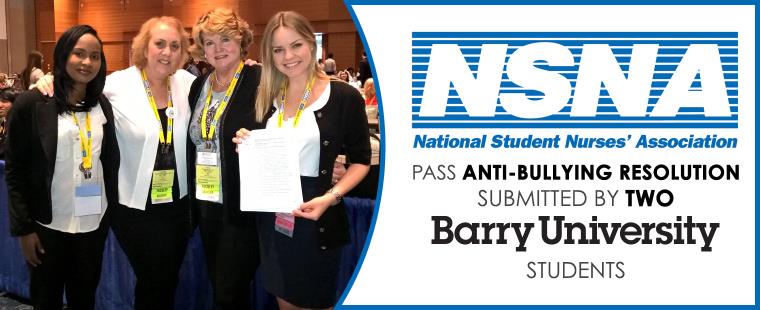Two Barry University nursing students Kristan Best and Dominique Lissade in conjunction with Hunter Bellevue School of Nursing in New York submitted a resolution to the National Student Nurses' Association (NSNA) on the topic of implementing training for nursing students on bullying awareness and intervention strategies. The resolution states that the prevalence of bullying in the nursing profession puts patients at risk for harm and negatively impacts nursing satisfaction and turnover.
Dominique and Best, are both past and present Presidents of Barry University’s Nursing Student Association, respectively. The NSNA House of Delegates passed the resolution recently, which requires all nursing students and nursing faculty in all nursing programs across the country to receive mandatory training regarding bullying awareness and intervention strategies. This resolution passed by overwhelming vote.
The National Student Nurses' Association, with a membership of 60,000 nationwide, mentors the professional development of future registered nurses and facilitates their entrance into the profession by providing educational resources, leadership opportunities, and career guidance. NSNA.org
The Resolution is written as follows:
Topic: Implementing training for nursing students on bullying awareness and intervention strategies.
Submitted by Barry University in conjunction with Hunter Bellevue School of Nursing in New York.
WHEREAS, in 2010 and 2014, the NSNA passed resolutions in support of decreasing incivility and horizontal violence; and WHEREAS, bullying in the nursing profession negatively affects patient safety as a result of medication errors and unsafe patient care; and WHEREAS, a lack of awareness, training and knowledge leaves nursing students vulnerable to bullying. These factors emerge early in the school setting and continue in the professional setting; and WHEREAS, schools have a responsibility for defining bullying and implementing guidelines and strategies to address this issue; and WHEREAS, educators have a responsibility to enforce a zero tolerance policy toward bullying, and should “influence the content of nursing curricula to include discussions about bullying and provide students with strategies for coping with negative experiences” (Clarke, 2012, p. 275); and WHEREAS, in a study of the effectiveness of assertiveness training in 2009, students identified positive emotional and stress benefits as a result. Encouraging assertiveness training in the undergraduate curriculum will serve to relieve stress in the professional setting; and WHEREAS, the “ANA believes it is a nurse’s right to work in a healthy work environment…where a nurse does not fear retaliation for speaking out against these actions” (ANA, 2015. para.7); therefore be it RESOLVED, that the National Student Nurses’ Association (NSNA) encourage its constituents to develop and support a position against bullying; and be it further RESOLVED, that the NSNA encourage its constituents to work with nursing schools to assess, develop, and implement a standard program of preventing bullying and reporting incidents; and be it further RESOLVED, that the NSNA encourage schools to educate students about procedures for reporting experiences of bullying in a confidential, supportive environment; and be it further RESOLVED, that the NSNA encourage schools to hold orientation sessions for all nursing instructors on bullying policies and how to teach these conflict resolution skills and assertiveness training to nursing students, and be it further RESOLVED, that the NSNA support this mandatory education be in the form of online training, live in-person training, and/or provide written information, including any other method deemed appropriate; and be it further RESOLVED, that the NSNA publish an article in Imprint supporting increased awareness and education programs in undergraduate nursing programs for the prevention of and interventions for bullying in nursing, if feasible; and be it further RESOLVED, that the NSNA send a copy of this resolution to the American Association of Colleges of Nursing, the National League for Nursing, the American Nurses Association, the National Council of State Boards of Nursing, the National Organization for Associate Degree Nursing, the National 57 Association of Public Hospitals and Health Systems, the American Assembly of Men in Nursing, the Nurses Service Organization, the International Nurses Association, and all others deemed appropriate by the NSNA Board of Directors.

